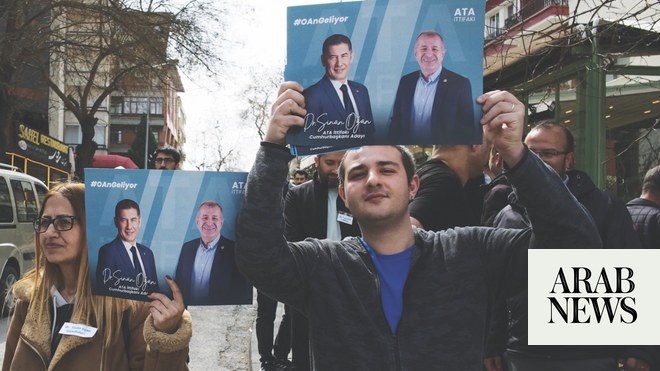
ISTANBUL: Sensing the best chance yet to end President Recep Tayyip Erdogan’s two-decade rule in Turkiye, his opponents are mobilizing to make sure every ballot is counted in a May election and to guard against any tampering in what is expected to be a tight vote.
With the stakes so high, concerns about potential irregularities have been heightened by upheaval wrought by February’s devastating earthquakes in the southeast, where some 50,000 people were killed and millions made homeless.
Yigit, 26, a student from southern Turkiye, said he will watch the polling in his hometown of Antakya come election day on May 14, to make sure nobody tries to cast ballots in the name of his parents, who died in the disaster.
“I will wait at the ballot box to make sure that no one else is voting in their place,” Yigit said.
His parents have not been officially declared dead because their bodies were not found in the rubble. They still appear as eligible voters, said Yigit, who declined to give his full name.
The election marks the toughest political challenge yet for Erdogan, who was already facing criticism over an economy in crisis when the earthquake struck. While polls show him trailing opposition candidate Kemal Kilicdaroglu, the race remains tight and campaigning is just beginning.
An alliance of six opposition parties hoping to unseat the president is planning measures to safeguard a free and fair election, including recruiting professionals such as lawyers to monitor the voting, said Idris Sahin, deputy chair of DEVA Party.
DEVA officials are comparing voter lists from Dec. 31 with the updated registry in the earthquake zone, he said, including checking whether those who moved away are registered in their new residences and whether those who died have been removed.
Observers should be able to prevent any attempts to cast votes in the names of people who died in the earthquake but who had yet to be removed from the records, Sahin added.
“It is not clear whether some citizens are alive or dead in the earthquake zone. Our members need to be careful about these records,” he said, adding that this number could be between 3,000-5,000 at most.
Opposition parties have alleged electoral irregularities in the past, including criticism of measures taken by the High Electoral Board and Erdogan’s influence over the country’s newsrooms.
Turkiye ranked the 123rd among 167 countries in 2019 according to the Electoral Integrity Project, an academic study which compares elections worldwide.
However, there were no accusations of major rigging in the most recent, 2018 presidential election and the opposition candidate conceded. Erdogan’s AK Party has said it is committed to a free and fair election that respects the will of the people. Turkish elections are typically monitored by hundreds of thousands of volunteers across the country of 85 million people.
Opposition parties and nongovernmental organizations say the exodus of more than 3 million people from the disaster zone poses extra concerns. The earthquake devastated 11 provinces that were home to 14 million people.
“We have a problem updating the electoral records correctly and ballot box security after such a disaster,” said Bekir Agirdir, a board member of pollster KONDA research.
“How many people are actually relocating? How many people will be properly registered on the voter lists?“
The YSK electoral board has said there are no obstacles to holding elections in the southeast, and has announced additional measures such as setting up ballot boxes for voters in temporary shelters and allowing those who moved away to easily change their registered address.
Vote and Beyond, an NGO focused on election security, will commission some 100,000 volunteers as monitors for its system to cross-check the records at each of the 200,000 ballot boxes.
Erdogan’s AK Party has also said it will commission observers.
Mehmet Rustu Tiryaki of the pro-Kurdish Peoples’ Democratic Party’s (HDP) said some 9 million voters are registered in the area affected by the earthquake. While some 300,000 to 500,000 of them were thought to have changed addresses, many of those who had left the disaster zone had not, added Tiryaki.
For Yigit, the earthquake and what he sees as the government’s slow response to the disaster weighs on him as he decides how to vote.
My parents “were not protected, and no help came. This time, I will also vote with this responsibility on my shoulders,” he said.












